The Google Nexus 5X Review
by Brandon Chester on November 9, 2015 8:00 AM EST- Posted in
- Smartphones
- LG
- Mobile
- Android 6.0
- Nexus 5X
Battery Life
Something that has typically been a bit of an issue on Nexus smartphones is the battery life. Some power saving features like process coalescing had actually been implemented by third parties in the past before they were ever moved into Android itself, which put Nexus phones at a bit of a disadvantage when compared to similar devices from your standard group of Android OEMs. Component choices can also heavily impact power usage. The Nexus 5 actually didn't fare too badly in either of these respects, but last year's Nexus 6 was the prime example of how a device's battery life can be crippled by a power hungry display. Since the Nexus 5X is being made by LG like the original Nexus 5 was, I was hopeful that we'd see battery life close to that of the other smartphones that have been released this year.
To characterize a device's battery life in various different scenarios we run them through our own WiFi web browsing test, along with the battery tests built into BaseMark OS II, PCMark, and GFXBench 3.0.
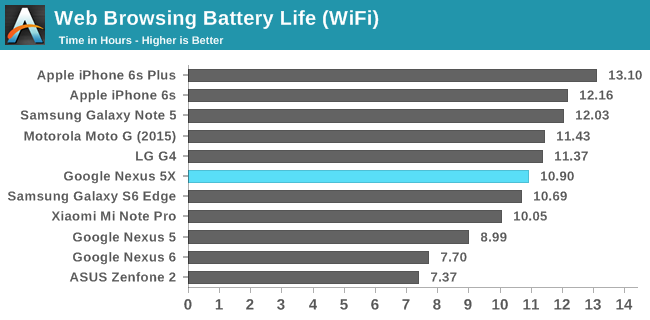
The Nexus 5X does well in our WiFi web browsing test. This is a fairly display-bound test, and if you actually just scale the Nexus 5's battery life by 1.174 which gives you the increase in battery capacity going from the 5 to the 5X you get a result that is only 21 minutes short of the 5X's lifetime in this test. With that in mind, it looks like display and WiFi power usage hasn't changed much from the Nexus 5. 10.9 hours isn't quite as good as what we've seen on some recent flagships and on the Moto G, but I think it's a perfectly respectable result, and it's a good improvement from the Nexus 5 even if it does come mostly from the battery capacity bump.
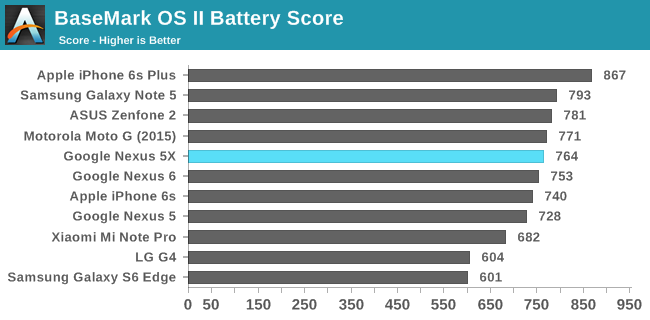
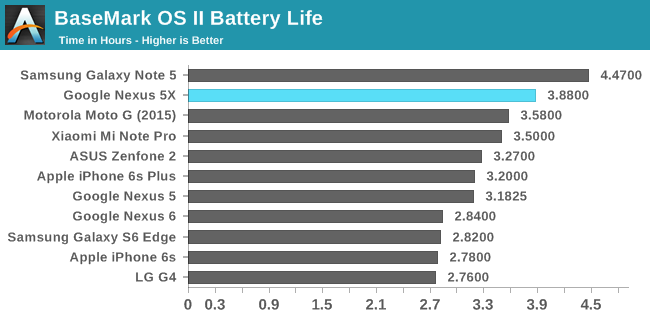
The Nexus 5X lasts longer than most other devices in BaseMark OS II's battery test. As mentioned in the sustained performance section of the review, the 5X can't really maintain a very high level of performance in this test due to Snapdragon 808's heavy thermal throttling. The battery score ends up being a result of the lower battery drain per unit of time, rather than due to sustaining high performance during the time it was alive like the score for the iPhone 6s. I don't really need to go over the performance situation again, but suffice to say the Nexus 5X should last a good period of time during CPU intensive tasks, but you can't expect the same level of performance as some other devices are providing.
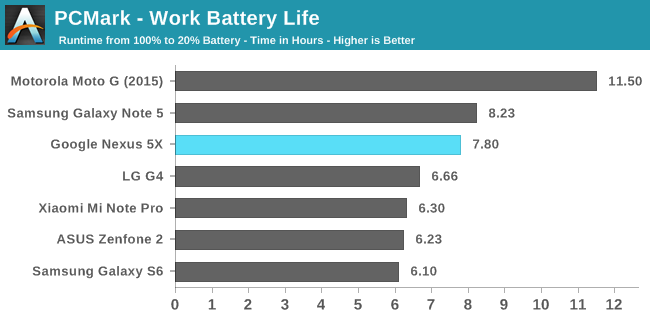
PCMark's battery test gives us a good idea of how long a battery will last in a mixed workload. The benchmark simply runs through all of PCMark's standard tests, which include web browsing, editing documents, playing video, and other tasks that many users perform frequently on their phones. The Nexus 5X does very well in this test, with a battery lifetime that is longer than most other devices, with only the much larger Galaxy Note 5 and the slow but battery packed Moto G lasting longer.
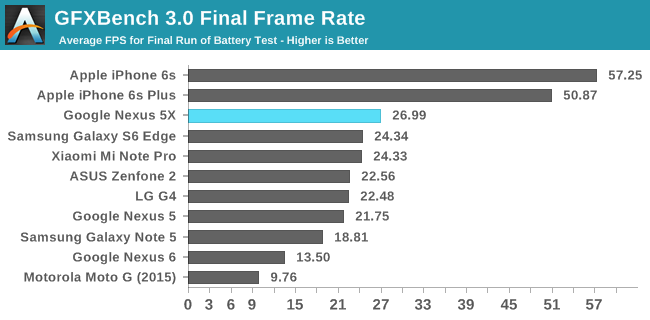
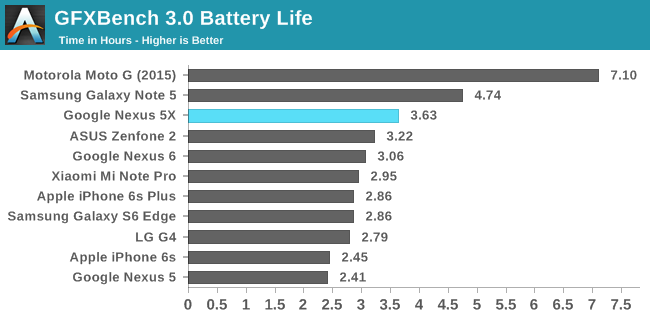
The Nexus 5X again does very well in GFXBench's battery test. There's obviously performance throttling, but during a prolonged GPU workload you'll actually end up getting performance that is competitive with the best Android devices on record. The only thing that I'd like to point out is that the frame rate is still too sinusoidal, which will translate to erratic performance when playing games, It would be good if Google could alter their frequency scaling and find a place between the 23 and 27fps levels that they could stabilize the frame rate at to eliminate this behavior.
Based on the results of all our battery tests I don't think battery life will be an issue for any Nexus 5X user. In my experience the battery life has also been very good, and the new Doze feature in Android Marshmallow seems to be doing its job well because there have been instances where I forget to plug the phone in at night and the battery drain during that time has been minuscule. While battery life may have been an issue with older Nexus devices, I think it's safe to say it's no longer a concern with the Nexus 5X.
Charging
Normally I just measure charge time, but with the Nexus 5X I wanted to talk about the charger itself and clear up some confusion. The Nexus 5X ships with a 15W charging block made by LG, with a newer USB Type-C port instead of a more traditional Type-A port. This means it's really only useful for charging Type-C devices - most users aren't likely to have a C-to-Micro-B cable - and while the Nexus 6P comes with a secondary USB Type-A to Type-C cable, the 5X only comes with a Type-C to Type-C cable. This means that by default you don't really have a way to charge the 5X using older chargers or connect it to a PC unless you buy a separate cable, as Type-C host ports are still rare outside of a handful of laptops and chargers. Obviously in the case of the 5X this is a cost concession, but I think users are going to find the decision quite annoying as a USB Type-A to Type-C cable may not be something you can easily find yet at a local electronics store, and online they're often fairly expensive branded cables.
I was fortunate enough to have various Type-C cables from my Chromebook Pixel review, and so I was able to investigate charging using different chargers. It is true that the Nexus 5X does not support Qualcomm Quick Charge, but I have to reiterate that this has nothing to do with the use of the Type-C connector like I've seen speculated for other devices in the past. Type-C is just a connector, nothing more, and the underlying protocols are still USB 2.0 data coupled with USB Power Delivery 2.0. Supporting Quick Charge has associated licensing and verification costs which add to a device's BOM, and if you're trying to keep costs down it makes sense to support fast charging with your own charger while avoiding incurring those costs by supporting a standard created by another company to accomplish the same thing with other chargers.
As for LG's charger, there's not a whole lot to say as far as the appearance, although you may get some questions about exactly what connector it uses if anyone ever asks to borrow it. Something that I found to be really bothersome is that the charger has a constant high pitched noise whenever you're charging a device, and as the device approaches full charge it gets louder and louder to the point that I've had to start charging the phone in another room. I had the exact same issue with the Motorola Turbo Charger that came with the Nexus 6, and it absolutely amazes me that such a problem continues to exist in shipping products. Eliminating coil whine has a small associated cost, but at $379 you're not playing at a level where that sort of concession is justified. What's worse is that a Nexus 5X owner will have to use the included charger for the foreseeable future, or buy a Type-C to Type-A cord.
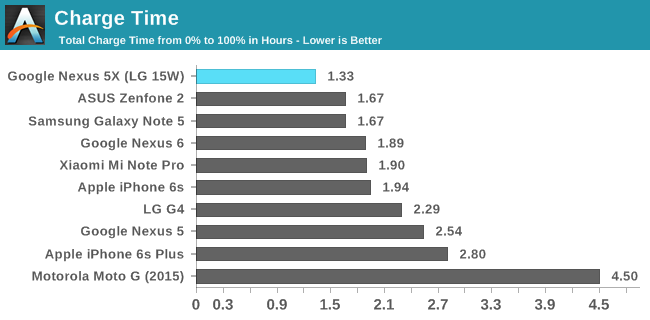
I measured the charge time in three different circumstances with the Nexus 5X. The first was using the included 15W charger, the second was using the Chromebook Pixel's 60W charger, and the third was an ASUS 18W Quick Charge 2.0 charger with a Type-A to Type-C cable. Both the Pixel's and the included LG charger actually took the same amount of time, so it doesn't look like the phone will draw above the 5V 3A output of the included charger. As for the ASUS 18W charger, it also took about 1.33hrs. Even though the phone isn't explicitly advertised as supporting Qualcomm Quick Charge, it will draw above your standard 5W if your charger supports it. 1.33hrs is the best charge time I've seen so far as well, partially owing to the fact that the battery isn't as big as some other larger devices.
One interesting thing that I wanted to mention is that the Nexus 5X uses a Fairchild FUSB301 USB controller which does allow for USB power delivery support. This means you could charge other devices using the Nexus 5X if you really wanted to, and I've confirmed that it works with devices like my camera and headphones, as well as other Android devices. You do need some sort of Type-C to Micro-B cable to make this work in most cases, but it's a cool feature nonetheless. It's important to note that the Nexus 5X is still a USB 2.0 data device, so file transfers are still limited to 480Mbps.
WiFi
While LTE has actually outpaced the speed of local WiFi in many markets, the reality of data caps, throttled usage, and issues with reception means that a smartphone will probably spend a lot of time connected to WiFi. In the case of the Nexus 5X I think having fast WiFi will actually be even more necessary than on other devices, because unless you own a very new Skylake computer, a Chromebook Pixel, or a MacBook, you're probably going to end up transferring your media to it over WiFi until you can source a Type-C to Type-A cable.
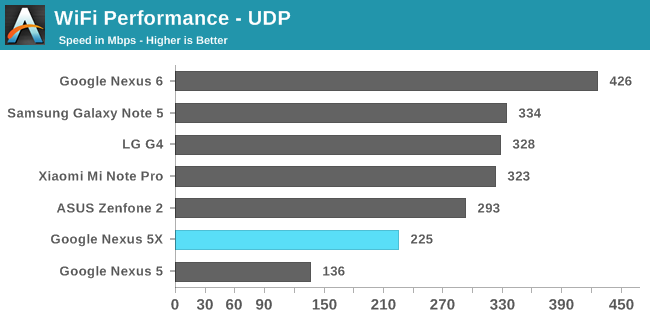
Unfortunately the Nexus 5X's WiFi performance is not very high for a dual spatial stream 802.11ac implementation. The peak UDP data rate was only 225Mbps, which is much lower than I expected. Limited size and space is obviously an issue when arranging the antennas in a smartphone, but ASUS achieved noticeably higher speeds with a single spatial stream implementation in a chassis that isn't that much larger. I don't expect that this is a software bug either, because the phone is registering a maximum theoretical link speed of 866Mbps.


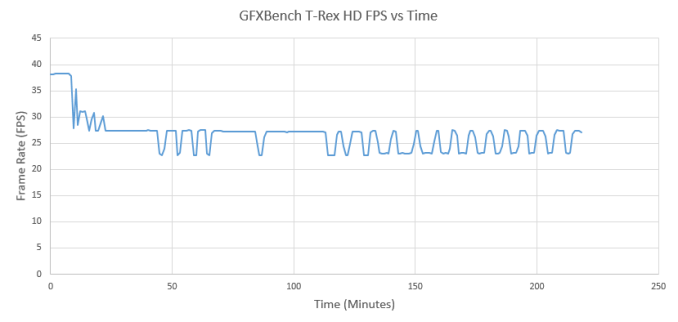
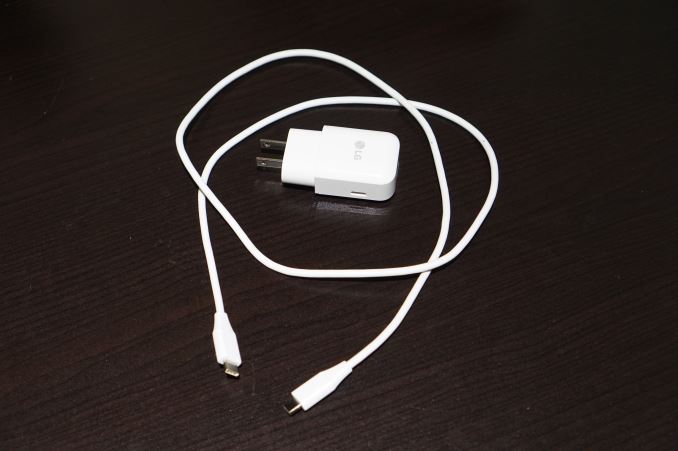
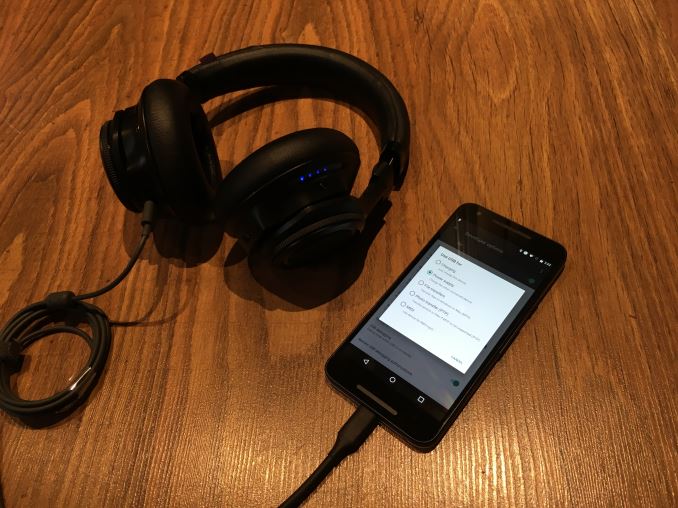








197 Comments
View All Comments
Jojo99 - Monday, December 21, 2015 - link
Do you by chance have a 16GB model? And is everything lagging?I have a 32GB model and don't really notice any lagging at all. Don't have any lock-up problems either.
The camera is better than the Nexus 5 but still not great, especially in low light. Lot of noise. Highlights also often get blown out. Trying to understand why I am seeing EXIF info of ISO 60 in low light. Doesn't make sense.
Also like the LG Nexus 5, if you take a camera shot where the sun is in the frame, you'll get a small blue or green spot in the lower part of the shot.
The camera definitely not anywhere as good as my friend's iPhone 6 camera or my 8 year old Canon point and shoot..
Aloonatic - Tuesday, January 12, 2016 - link
I have the 32 GB model and it stalls, locks up, freezes, lags and apps crash often, with most apps I use, and when navigating system menus too.Performance wise, with general use, it's really no improvement over my 1st gen Moto G!
I've found that I've restarted this phone several times, 3 or 4 times a week at least. I wish I'd seen some of the comments here before buying one.
Aloonatic - Tuesday, January 12, 2016 - link
Why didn't I see your comment before I got one.I have no idea about the Nexus5 but my 5x has been a bit of a nightmare, and I replaced it as my Moto G was too slow and laggy, which I put down to it being 2 years old and lacking RAM, this is no better.
flyguy29 - Thursday, December 24, 2015 - link
I was under the belief that the Nexus devices were the flagship statement Google - collaborated smartphones... It's positioning as a "pure android" experience still does not address key touch points in overal consumer targets. But at least the mission statement is clear- a pure Android experience without any pretenses about superior screens, camera, etc- it's all about the fundamentals of a smart phone's functions and how a user engaged themAloonatic - Tuesday, January 12, 2016 - link
I got one of these after my 1st Gen Moto G started flagging and, frankly, I don't notice a great improvement in performance.-Sure, screen is bigger but the Moto Gs might have been small but it looked pretty good.
-The finger print senor is handy...
-However, it still stalls on unlocking all the time.
-Just trying to send a message can take 10s of seconds, and the keyboard often appears so you type, nothing happens, and then half a sentence appears in rapid fire.
-Switching between apps is still far too slow, and seems as slow as with my Moto G to me.
All in all, not a great deal of improvement over a cheap phone from a couple of years ago, which is pretty pathetic really, and seeing as this phone has more RAM and more horsepower under the hood you have to point the finger at Android OS itself, as others have mentioned.
blzd - Tuesday, January 19, 2016 - link
No performance issues on my 5x, runs as smooth as my N5 and gaming is not only faster, but the device runs considerably cooler while doing so.The camera and battery life are also big improvements over the N5.
If you have performance issues with your 5x look to your apps and services as the cause. Apps like Tasker and Snapchat have been known to be an issue. Also some users had issues restoring from a previous device and were able to resolve them by a factory reset without restoring.
Aloonatic - Sunday, February 7, 2016 - link
All I can say is that the N5 must have been terrible. Honestly, I have no axe to grind here(I've gone for a straight Nexus phone as I've tried every manufacturer out there and not been too impressed) , but this phone feels like a huge mistake to me.I am used to the normal smart phone cycle. 1st 6 months, great, everything is gravy. Then 6 to 18 months, it get gradually worse. THen the last 6 months are a grind where all you want to do is smash your phone into a million pieces as it's so slow and useless (even with factory resets etc, I'm not a muppet)
This phone feels like it's in the mid part of that cycle, so god knows what it'll be like at the endof my 24 month contract.
The battery is woeful, and I'm hardly a power user. I had to buy a car charger just to make it last the day.
I have only a handful of apps installed and they are all from major players, not a load kids making apps for fun and releasing them.
I have to power-cycle it multiple times each week.
It lags, it's slow, it's a mess.
Then the finger print scanner doesn't always work ,and the day dream mode fails all the time so it can't even work as a bed side clock when on charge any more.
It is no faster or smoother than my 2 year old Moto G.
Not worth the money.